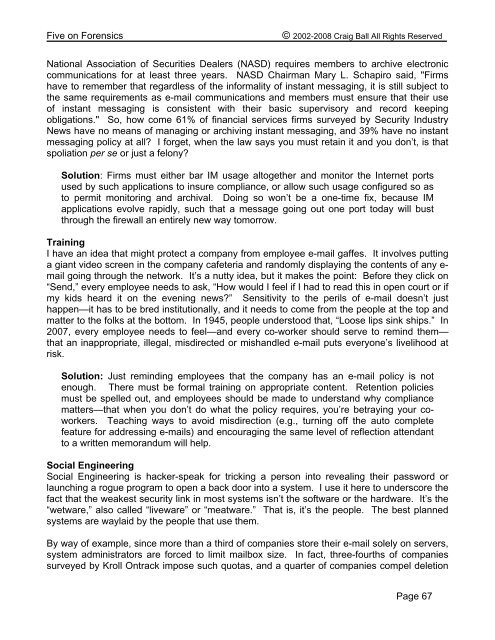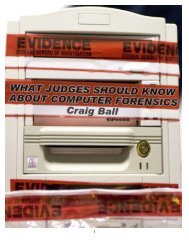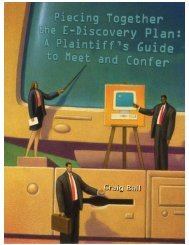Five on Forensics Page 1 - Craig Ball
Five on Forensics Page 1 - Craig Ball
Five on Forensics Page 1 - Craig Ball
You also want an ePaper? Increase the reach of your titles
YUMPU automatically turns print PDFs into web optimized ePapers that Google loves.
<str<strong>on</strong>g>Five</str<strong>on</strong>g> <strong>on</strong> <strong>Forensics</strong><br />
© 2002-2008 <strong>Craig</strong> <strong>Ball</strong> All Rights Reserved<br />
Nati<strong>on</strong>al Associati<strong>on</strong> of Securities Dealers (NASD) requires members to archive electr<strong>on</strong>ic<br />
communicati<strong>on</strong>s for at least three years. NASD Chairman Mary L. Schapiro said, "Firms<br />
have to remember that regardless of the informality of instant messaging, it is still subject to<br />
the same requirements as e-mail communicati<strong>on</strong>s and members must ensure that their use<br />
of instant messaging is c<strong>on</strong>sistent with their basic supervisory and record keeping<br />
obligati<strong>on</strong>s." So, how come 61% of financial services firms surveyed by Security Industry<br />
News have no means of managing or archiving instant messaging, and 39% have no instant<br />
messaging policy at all? I forget, when the law says you must retain it and you d<strong>on</strong>’t, is that<br />
spoliati<strong>on</strong> per se or just a fel<strong>on</strong>y?<br />
Soluti<strong>on</strong>: Firms must either bar IM usage altogether and m<strong>on</strong>itor the Internet ports<br />
used by such applicati<strong>on</strong>s to insure compliance, or allow such usage c<strong>on</strong>figured so as<br />
to permit m<strong>on</strong>itoring and archival. Doing so w<strong>on</strong>’t be a <strong>on</strong>e-time fix, because IM<br />
applicati<strong>on</strong>s evolve rapidly, such that a message going out <strong>on</strong>e port today will bust<br />
through the firewall an entirely new way tomorrow.<br />
Training<br />
I have an idea that might protect a company from employee e-mail gaffes. It involves putting<br />
a giant video screen in the company cafeteria and randomly displaying the c<strong>on</strong>tents of any e-<br />
mail going through the network. It’s a nutty idea, but it makes the point: Before they click <strong>on</strong><br />
“Send,” every employee needs to ask, “How would I feel if I had to read this in open court or if<br />
my kids heard it <strong>on</strong> the evening news?” Sensitivity to the perils of e-mail doesn’t just<br />
happen—it has to be bred instituti<strong>on</strong>ally, and it needs to come from the people at the top and<br />
matter to the folks at the bottom. In 1945, people understood that, “Loose lips sink ships.” In<br />
2007, every employee needs to feel—and every co-worker should serve to remind them—<br />
that an inappropriate, illegal, misdirected or mishandled e-mail puts every<strong>on</strong>e’s livelihood at<br />
risk.<br />
Soluti<strong>on</strong>: Just reminding employees that the company has an e-mail policy is not<br />
enough. There must be formal training <strong>on</strong> appropriate c<strong>on</strong>tent. Retenti<strong>on</strong> policies<br />
must be spelled out, and employees should be made to understand why compliance<br />
matters—that when you d<strong>on</strong>’t do what the policy requires, you’re betraying your coworkers.<br />
Teaching ways to avoid misdirecti<strong>on</strong> (e.g., turning off the auto complete<br />
feature for addressing e-mails) and encouraging the same level of reflecti<strong>on</strong> attendant<br />
to a written memorandum will help.<br />
Social Engineering<br />
Social Engineering is hacker-speak for tricking a pers<strong>on</strong> into revealing their password or<br />
launching a rogue program to open a back door into a system. I use it here to underscore the<br />
fact that the weakest security link in most systems isn’t the software or the hardware. It’s the<br />
“wetware,” also called “liveware” or “meatware.” That is, it’s the people. The best planned<br />
systems are waylaid by the people that use them.<br />
By way of example, since more than a third of companies store their e-mail solely <strong>on</strong> servers,<br />
system administrators are forced to limit mailbox size. In fact, three-fourths of companies<br />
surveyed by Kroll Ontrack impose such quotas, and a quarter of companies compel deleti<strong>on</strong><br />
<strong>Page</strong> 67













